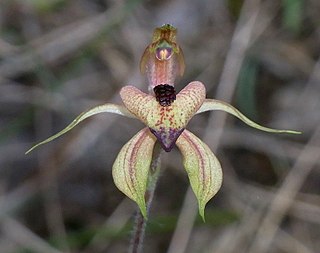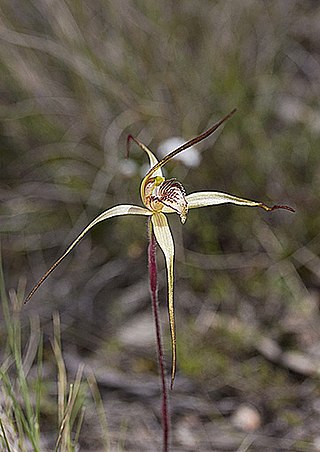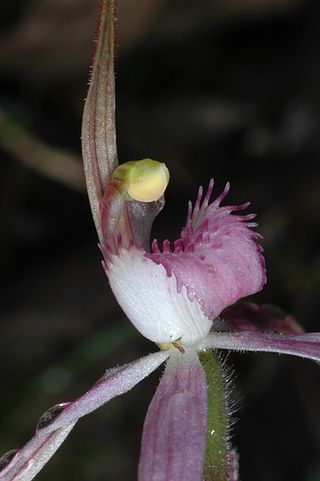Caladenia robinsonii, commonly known as the Frankston spider orchid, is a plant in the orchid family Orchidaceae and is endemic to Victoria. It is a ground orchid with a single hairy leaf and one or two red and creamy-yellow flowers with dark red glandular tips on the sepals. In 2010 only about forty specimens of this plant, growing in a single population were known.

Caladenia australis, commonly known as southern spider orchid, is a plant in the orchid family Orchidaceae and is endemic to Victoria, although it was also found on one Bass Strait island on one occasion in 1968. It has a single hairy leaf and usually only one creamy-yellow flower with red streaks, the flower on a hairy stalk.

Caladenia capillata, commonly known as white daddy long legs or wispy spider orchid, is a plant in the orchid family Orchidaceae and is endemic to Victoria and South Australia. It is a ground orchid with a single hairy leaf and up to three cream-coloured to yellowish flowers with long, thread-like petals and sepals and a very small labellum.

Caladenia cardiochila, commonly known as thick-lipped spider-orchid, fleshy-lipped caladenia and heartlip spider-orchid, is a plant in the orchid family Orchidaceae and is endemic to Victoria and South Australia. It is a ground orchid with a single hairy leaf and one or two yellowish-green, red-striped flowers on a thin, wiry stem.

Caladenia clavigera, commonly known as plain-lip spider orchid or clubbed spider orchid, is a plant in the orchid family Orchidaceae and is endemic to Australia. It is a ground orchid which grows as scattered individuals or in small colonies in Victoria, New South Wales and South Australia. It has a single leaf and one or two small yellowish-green and red flowers.

Caladenia cruscula, commonly known as the reclining spider orchid, is a species of orchid endemic to a small area in the south-west of Western Australia. It has a single hairy leaf and a single cream-coloured flower with a long red fringe on the sides of its labellum.

Caladenia echidnachila, commonly known as the fawn spider orchid, is a plant in the orchid family Orchidaceae and is endemic to Tasmania. It is a ground orchid with a single, hairy leaf and one or two fawn-coloured flowers with thin red lines on the sepals and petals.

Caladenia fulva, commonly known as the tawny spider orchid, is a plant in the orchid family Orchidaceae and is endemic to a small area in Victoria. It is a ground orchid with a single hairy leaf and one or two creamy-white to pale yellow flowers. Only two small populations are known, although both are in nature reserves.
Caladenia hastata, commonly known as Mellblom's spider orchid, is a plant in the orchid family Orchidaceae and is endemic to Victoria. It is a ground orchid with a single hairy leaf and up to three white to cream-coloured flowers with red markings on the labellum.

Caladenia hirta subsp. hirta, commonly known as the sugar candy orchid or candy orchid, is a plant in the orchid family Orchidaceae and is endemic to the south-west of Western Australia. It has a single leaf and up to three creamy-white or pink flowers with brownish tips and a brown back.

Caladenia horistes, commonly known as the cream spider orchid, is a species of orchid endemic to the south-west of Western Australia. It has a single, hairy leaf and one or two, creamy-yellow flowers which have a red-striped labellum and long, dark, thread-like tips on the sepals and petals.
Caladenia magnifica, commonly known as the magnificent spider orchid, is a species of orchid endemic to Victoria. It has a single leaf and one or two reddish crimson or yellow flowers streaked with crimson and with dark reddish tips. It has not been sighted since 1979 and is presumed to be extinct.

Caladenia orientalis, commonly known as the eastern spider orchid, is a species of orchid endemic to Victoria. It is a ground orchid with a single hairy leaf and one or two creamy-white to yellowish-green flowers and which only grows near the Mornington Peninsula.
Caladenia patersonii is a plant in the orchid family Orchidaceae and is native to Victoria and Tasmania. It is a ground orchid with a single hairy leaf and one or two creamy-white, yellowish or pink flowers.

Caladenia pendens subsp. pendens, commonly known as the pendant spider orchid, is a plant in the orchid family Orchidaceae and is endemic to the south-west of Western Australia. It has a single hairy leaf and up to three relatively large, creamy-white flowers with long drooping petals and sepals and sometimes has a sickly-sweet scent.

Caladenia pendens subsp. talbotii, commonly known as Talbot's spider orchid, is a plant in the orchid family Orchidaceae and is endemic to the south-west of Western Australia. It has a single hairy leaf and one or two white, red and yellow flowers with long drooping petals and sepals and sometimes has a citrus-like scent.

Caladenia rosella, commonly known as the rosella spider orchid, is a plant in the orchid family Orchidaceae and is endemic to south-eastern Australia. It is a ground orchid with a single hairy leaf and a single scented pink flower. Although it may have had a wider distribution in the past, the total number of plants in 2000 was estimated to be 120 in four populations in Victoria. There is a single record from New South Wales but the orchid is classified as "extinct" in that state.
Caladenia petrensis, commonly known as the rock spider orchid, is a plant in the orchid family Orchidaceae and is endemic to the south-west of Western Australia. It has a single erect, hairy leaf and up to three pale yellow flowers with drooping lateral sepals and petals.

Caladenia xantha, commonly known as the primrose spider orchid, is a species of orchid endemic to the south-west of Western Australia. It has a single erect, hairy leaf and up to three yellow flowers with a cream-coloured, brown-striped labellum.
Caladenia fuliginosa is a plant in the orchid family Orchidaceae and is endemic to the Yorke Peninsula in South Australia. It is a ground orchid with a single hairy leaf and a single relatively large, creamy-yellow flower, sometimes with reddish lines. The flowers have a smell resembling hot metal.














